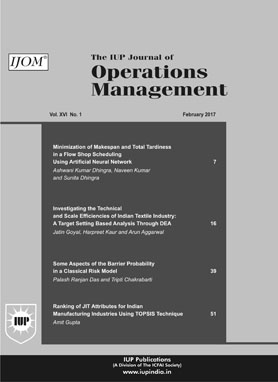
Feb' 24
|
|
The IUP Journal of Operations Management
ISSN: 0972-6888
A "peer-reviewed" journal included in EBSCO and ProQuest (Part of Clarivate) Database
It is a quarterly journal focusing on Inventory control, Supply Chain Management, Enterprise Resource Planning (ERP), Just-In-Time (JIT), Total Quality Management (TQM), Business Process Re-engineering, Logistics management, Six Sigma, Benchmarking and flexible manufacturing systems.
| Focus Areas | |
|---|---|
|
|
|
|
|
|
|||
| Article | Price (₹) | ||
| Examining the Role of Single Minute Exchange of Die and Kanban in Productivity Improvement |
100
|
||
| Business Process Optimization for Enhanced Organizational Performance: An Overview |
100
|
||
| Unraveling the Complex Nexus Between Demurrage Costs and Logistics Management |
100
|
||
| Probability of Defects in Manufacturing: A Critical Analysis |
100
|
||
Examining the Role of Single Minute Exchange of Die and Kanban in Productivity Improvement
The study examines the role of lean manufacturing principles of Single Minute Exchange of Die (SMED) and Kanban in augmenting productivity through metrics of reduction in inventory, changeover time and units produced per lot. The paper uses case study-based approach to examine the significant effects of SMED and Kanban on an emblem manufacturing setup. Primary data pertaining to emblem produced in maximum quantity was gathered. The data collection process involved identifying internal and external activities during injection molding process. Analysis of the data revealed which of the activities can be removed and which can be standardized in order to reduce setup time. The results showed that SMED method facilitated a reduction of 53% in setup time. Significantly, the method saved about 25 min in setup time per batch, leading to a total saving of 750 min per month. In addition, metrics of number of units produced daily and work-in-process inventory showed marked improvements, as the results showed a reduction by 25% and 50% respectively. The application and recording of beneficial outcomes of both SMED and Kanban in an automotive parts manufacturing company, which forms a vital link in the entire supply chain, makes the contribution of this study novel.
Business Process Optimization for Enhanced Organizational Performance: An Overview
Business process optimization (BPO) is a crucial process in organizations that aims to maximize efficiency, minimize costs, and improve overall business performance. It involves modifying procedures to maximize parameters while adhering to certain limitations. The primary objectives of process optimization are productivity, efficiency maximization, and cost minimization. By examining current procedures, identifying areas for development, and implementing plans to expedite and enhance these procedures, organizations can increase productivity, lower costs, and boost customer satisfaction. By streamlining operations, organizations can eliminate bottlenecks and unnecessary tasks and enhance productivity, ultimately leading to sustainable growth and improved overall output. Lean Six Sigma, Kaizen, Deming Cycle, and other organizational development methodologies are used in BPO. Organizations can increase productivity by streamlining and optimizing their operations. This enables them to produce more in the same amount of time with the same resources, improving their overall output and growth. This paper provides a summary of the body of research on BPO and suggests possible study subjects based on secondary data. The intention is to provide the reader with a comprehensive overview of BPO strategies.
Unraveling the Complex Nexus Between Demurrage Costs and Logistics Management
This paper delves into the macroscopic and microcosmic dimensions of demurrage, offering insights into its widespread implications and exploring anonymized cases within the logistics sector. At the global level, the analysis reveals that demurrage is not just a ticking clock on container delays but a dynamic force with billions in annual costs, influencing the very fabric of the shipping industry. A nuanced examination of demurrage spending based on container days in ports underscores the need for tailored strategies to optimize efficiency across varying periods of delays. Zooming in on these various anonymized cases within the logistics sector, the analysis unravels a corporate tapestry woven with challenges. Mismanagement by outsourced logistics partners and storage capacity constraints emerge as primary hurdles, demanding strategic solutions. Strategic solutions such as including vendor management, capacity optimization, technology integration, and meticulous documentation, stand out as vital pillars for companies navigating the waves of demurrage.
Probability of Defects in Manufacturing: A Critical Analysis
The study gives a critical analysis of various aspects of probability and alternative methods to understand the probability of defects within manufacturing. It presents the probability of defects as a coherent set of outcomes and adopts a binomial approach by demonstrating the relationship between defective and non-defective moments within production. It analyzes the probability of defects in a continuous distribution process that occurs in a certain range of observations but provides precision on the characteristic of the function. The paper explores the function of the defect without any other parameters like periods or standard deviation. Using the Lebesgue integral to eliminate the presence of non-defective items, the focus was on developing a function or graph just made of defects. For this, it uses various methods of probability analysis in the process.